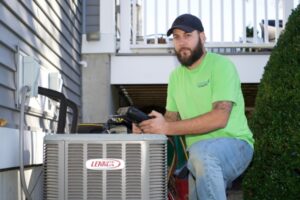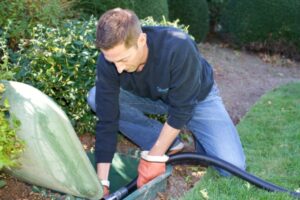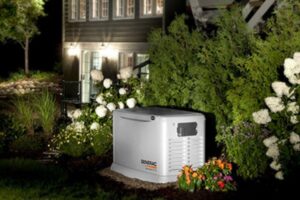Practical Techniques for Maintaining Mold-Free Air Conditioners
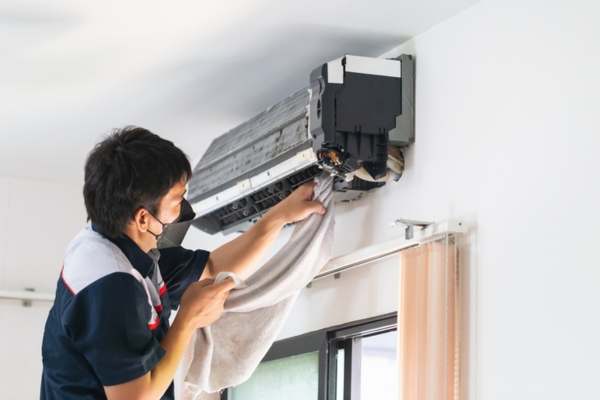
Contents
The U.S. Environmental Protection Agency outlines three essential conditions for mold development: moisture, food for the mold, and oxygen. This indicates that almost any wet spot in your home is a potential breeding ground for mold. Air conditioning systems, in particular, are highly susceptible to mold infestation.
This is concerning because air conditioner mold can quickly spread, negatively affecting both pets and people’s health. Therefore, engaging a certified HVAC expert, like Columbus Energies, for regular inspection is crucial to maintaining a mold-free living space.
Best Ways to Prevent Air Conditioner Mold

The mold in your air conditioning system can result in significant repair costs. It’s important to understand that mold damage is covered by home insurance when it stems from an event explicitly included in your policy, such as appliance-related flooding.
Safeguarding your air conditioner against mold is crucial for health reasons and is a smart financial move. This article highlights the significance of keeping a mold-free air conditioning system and offers proven methods for its prevention.
Why Air Conditioner Mold is Dangerous
While not always life-threatening, mold in the home can severely affect health, as noted by Medical News Today. It releases toxins that primarily target the respiratory system, causing allergic reactions, breathing issues, and conditions such as aspergillosis.
The danger increases with mold in air conditioners, as it can quickly spread through the home. Mold in AC exposes inhabitants to harmful spores. Furthermore, mold threatens the air conditioner’s functionality, mainly if it invades the electrical parts, diminishing efficiency and potentially necessitating costly repairs or replacement.
Don’t compromise on air quality. Choose Columbus Energies for thorough maintenance and cleaning of your air conditioner. Contact us for service today!
How to Spot Mold in the AC Unit
Recognizing the health hazards of mold, it’s vital to be alert to signs that it may have infiltrated your air conditioner. Mold prefers the moist sections of an AC unit, rendering it difficult to spot with the naked eye. This challenge is intensified by mold spores being microscopic and only visible once they aggregate into substantial clusters. For a thorough assessment of mold presence in your air conditioner, its ventilation system, or any area of your home, seek the expertise of a professional HVAC contractor.
An experienced HVAC specialist with the necessary expertise and knowledge from handling similar cases can identify mold presence, including microscopic and invisible spores. Therefore, it’s crucial to watch for signs that point to mold growth in your air conditioning system.
Signs of Air Conditioner Mold
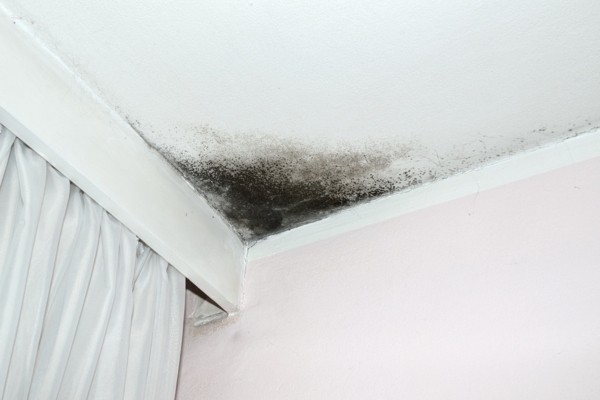
- Musty Smell From the Air Conditioner: A musty odor is frequently the first and most unmistakable indication of mold or mildew. An inexplicable musty scent in your home often originates from mold thriving within your air conditioner. This smell is a clear signal to inspect further.
- Visible Mold Signs: While mold is often microscopic in its early stages, it becomes noticeable as it grows and releases spores. Mold’s color spectrum—ranging from black, gray, white, green, red, orange, brown, to purple—depends on factors like moisture, light, and the nutrients it consumes. These color variations make mold visible. Be vigilant for any odd color patches or growths on or near your air conditioner, as they could be evidence of mold.
- Increased Room Humidity: If you notice a significant rise in humidity levels indoors while the air conditioner is operational, it might suggest mold proliferation within the system. Air conditioners are designed to cool the air and lower humidity levels. However, if mold blocks its components, the unit might not effectively reduce humidity, resulting in abnormally high indoor humidity.
- Health Issues: The onset of illness among household members or pets concurrent with using the air conditioner could indicate mold contamination. Symptoms typically linked to mold exposure include sneezing, coughing, watery eyes, wheezing, nasal congestion, itchy skin, and other allergic responses. Those with asthma might experience intensified symptoms when exposed.
How to Remove Mold from Your Air Conditioner
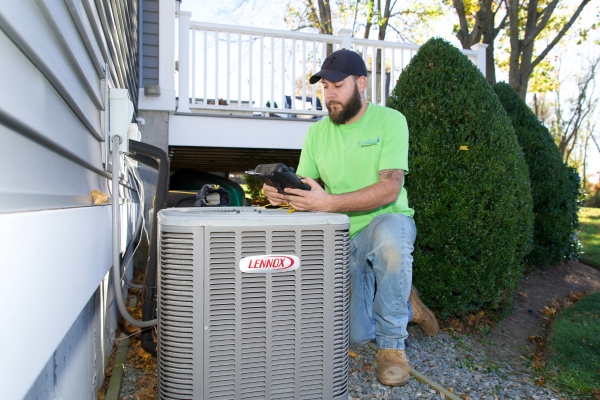
Due to mold removal’s intricate nature and health hazards, it’s essential to rely on a qualified and experienced HVAC professional for this task. Certified HVAC contractors are equipped with the expertise to efficiently and safely handle mold issues within air conditioning systems. Here are the steps a professional might undertake to eradicate mold from your air conditioning system:
- Air Conditioning Unit Inspection: The professional will start with a detailed inspection of your air conditioner and ductwork to pinpoint the mold’s spread and specific locations.
- Assessment of Your Cooling System: Once the mold is confirmed, the specialist will evaluate the infestation’s severity to decide on the best course of action for remediation.
- Mold Containment: The contractor will implement containment protocols to prevent the dispersion of mold spores throughout your home while the removal is underway.
- Air Filtration: Air scrubbers and HEPA filters will be critical in capturing airborne mold spores, significantly improving indoor air quality during the cleanup process.
- AC Mold Removal: The contractor will employ specific cleaning solutions and equipment to meticulously clean mold from the air conditioner and ducts, ensuring every mold spore is removed.
- Mold Growth Prevention: After the mold is eliminated, preventive advice might be offered, including enhancing ventilation, repairing any leaks, or installing a dehumidifier to mitigate the risk of mold recurrence.
- Proper Air Conditioner Maintenance: It’s recommended that the HVAC system be maintained according to a routine schedule to ensure its efficient operation and keep it free from mold.
Engaging a professional HVAC contractor to inspect, clean, and maintain your air conditioning system is vital to effectively removing mold and preventing its return, protecting the air quality in your home and your family’s health.
Keep your air conditioner running smoothly and mold-free with Columbus Energies’ professional maintenance services. Call us now to schedule!
Tips to Prevent Air Conditioner Mold

Catching mold in your air conditioner usually indicates a significant problem, possibly with some damage already incurred. This makes prevention crucial for dodging the severe issues mold can cause. Regular tune-ups by a professional HVAC contractor are vital to keeping your air conditioning system clear of mold. To protect your system against mold, a knowledgeable HVAC contractor will carry out several essential maintenance activities:
- Disinfecting the Air Conditioning Unit: A vital component of a healthy air conditioning system is thoroughly disinfecting the air conditioner, including ducts and ventilation parts, to remove mold and pathogens. HVAC professionals utilize disinfectants approved by the EPA to achieve this.
- Cleaning and Replacing AC Filters: Maintaining excellent air quality involves cleaning your filter every two weeks, especially at high pollution levels. Furthermore, replacing filters every 45 to 90 days, as the U.S. Department of Energy advises, is essential for keeping your air clean. A proficient HVAC contractor most effectively handles this task to ensure your system operates at peak efficiency.
- Applying a Mold Inhibitor: This preventive measure involves a chemical treatment designed to ward off the growth of mold and mildew in your cooling system.
- Keeping Air Ducts Dry: Moisture is critical to mold and mildew development within air ducts. Ensuring the ducts remain dry is crucial, which can be achieved through comprehensive cleaning, timely repairs, and replacing any components compromised by water damage.
- Installing a UV Light: UV light technology effectively neutralizes many pathogens, offering a strong preventative measure against mold growth in your air conditioner.
Trust Columbus Energies to keep your air conditioner clean and mold-free. Contact us now for expert maintenance!
Conclusion
Mold in air conditioning systems threatens your home’s structural health and the well-being of everyone inside. To protect your living space and ensure the health of its occupants, it is vital to partner with a reputable HVAC technician for routine air conditioner inspections and maintenance. A certified HVAC expert can also offer expert recommendations on preventing mold growth, helping keep your home a secure and healthy environment for all.
Contact Columbus Energies for Top-Quality Air Conditioning Services
Columbus Energies excels in providing premier heating and cooling solutions within Southeastern Massachusetts and the Rhode Island region. Our team, composed of expertly trained and professionally certified technicians, is dedicated to enhancing your HVAC system’s performance through outstanding tune-ups, repairs, installations, and replacements.
We’re committed to providing affordable pricing for our comprehensive heating and cooling services, aiming to improve comfort, optimize energy efficiency, and cut cooling costs. Whether you need an HVAC repair or are considering an upgrade, we provide personalized recommendations to fit your needs and budget, backed by a satisfaction guarantee. For an air conditioner tune-up or consultation, contact Columbus Energies today. Free in-home estimates are available.
Contact us now by calling (508) 674-1492 to speak to one of our home comfort specialists! Click the link to view our HVAC service area.

Related Articles:
